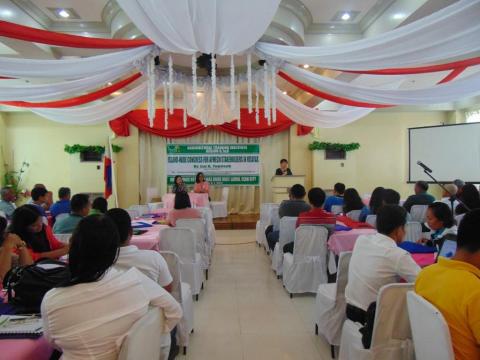Dr. Luz Taposok serves as the guest speaker during the Island-Wide Congress for AFMech Stakeholders in Cebu.
LAHUG, Cebu City – To express support and appreciation to the stakeholders of the Agriculture and Fisheries Mechanization (AFMech) in the Philippines, OIC-Director Luz Taposok of the Agricultural Training Institute (ATI) served as the guest speaker during the recently concluded Island-Wide AFMech Congress in the Visayas.
Dr. Taposok underscored the significance of building support systems for the AFMech Law or Republic Act (RA) 10601.
“The support system of this law should also empowered to provide services for our farmers and fishers.”
The congress, according to the OIC-Director, is a venue for series of discussions to point out issues, challenges and priorities with regard to the implementation of RA 10601.
“It is necessary to see how far we have come and what we still need to do to achieve our objectives in agriculture and fisheries machinery. It is vital to be updated of the consistent implementation of the AFMech Law,” she stated.
The OIC-Director encouraged the participants to continuously improve their technical and management capabilities in agricultural and fisheries machinery. She as well urged them to continue attending trainings and activities that will equip them with the proper knowledge, attitude and skills needed to perform various processes pursuant to the AFMech Law.
Also, she commented that the theme “Agriculture and Fishery Mechanization: Prime Program on the Development of Appropriate Technologies for Poverty Alleviation, Food Security and Sufficiency” explicitly portrays the reality these days. That is, technological intervention is central to our agricultural and fisheries labor and production.
“Through mechanization, we are able to produce quality products and maximize our farming areas. Machinery operations also allow double productivity and efficient labor strategies.”
While Dr. Taposok noted the essence of the provisions of the AFMech Law and its potential to make a way out of poverty, she likewise reminded the agricultural engineers and practitioners to observe proper and responsible agricultural and fisheries mechanization.
“As I always say, machinery isn’t always about double productivity. Let us all take good care of our environment for it is our main source of food and livelihood.”
Other speakers during the event include Center Director Carolyn Daquio of ATI Region VII, Engr. Ariodear C. Rico, Chairman of the Professional Regulatory Board of Agricultural and Biosystems Engineering, Engr. Dimple A. Durias from the Philippine Center for Postharvest Development and Mechanization (PHilMech), Engr. Avejun A. Abucot from the Office of the Provincial Agriculturist in Cebu, and several professors from Bohol Island State University, Visayas State University, Capiz State University and Misamis Oriental State College of Agriculture and Technology.
Some 150 agriculture engineers participated the island-wide congress held last June 5 to 7, 2017 at the Cebu Northwinds Hotel.

